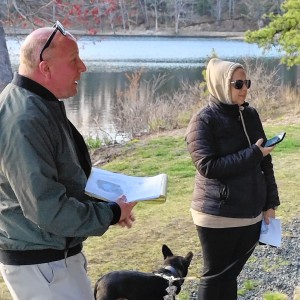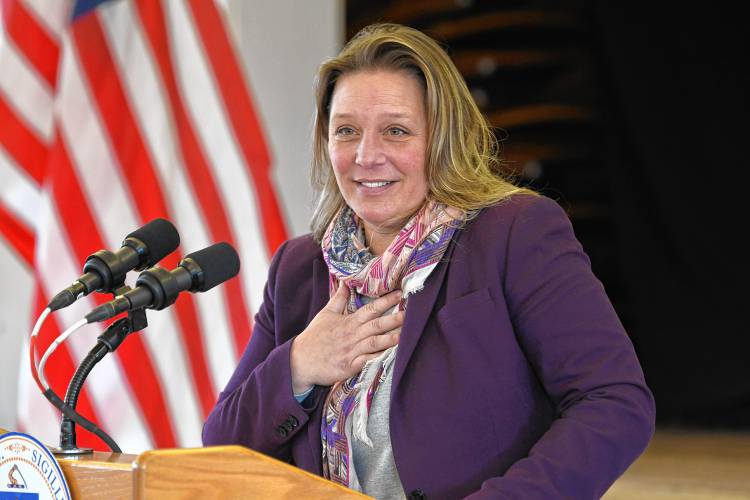Pioneer Valley residents testify in favor of rural school aid bill
| Published: 11-01-2023 4:00 PM |
BOSTON — Educators, town officials and students from across the Pioneer Valley appeared before the Legislature’s Joint Committee on Education on Monday to share their support for bills that would codify several recommendations to ensure the stability of rural school districts.
With perspectives from nearly every angle, those testifying in the State House and virtually said bills H.3567 and S.2388, titled “An Act to Provide a Sustainable Future for Rural Schools,” would help rural schools succeed by fully funding a $60 million recommendation for rural school aid, funding special education and other forms of transportation, and assisting districts that are interested in shared services or regionalization, among other provisions.
Leading the charge was the Gateway Regional School District, which brought its superintendent, several staff members, high schoolers and a crew of Chester Elementary School fourth graders, who talked about the challenges they face, as well as how the school serves as a center of their community.
“Rural living is not for the faint of heart, especially at Chester Elementary School,” said fourth grader Tucker Robitaille, who was joined by classmates Sophia Stone, Brewtus Briggs and Destiny Martinez. “A good example of this is when we had to rely on the school to provide showers and drinking water to those without for a whole week when a main pipe burst in our town last summer.”
The two bills are a follow-up to the July 2022 “A Sustainable Future for Rural Schools” report from the state’s Special Commission on Rural School Districts, which identified the pressing challenges directly inhibiting rural schools’ and towns’ abilities to educate their children. The House version is sponsored by Rep. Natalie Blais, D-Deerfield, and the Senate counterpart by Sen. Jo Comerford, D-Northampton.
Among the Franklin County and Hampshire County representatives testifying Monday were Mohawk Trail and Hawlemont regional school districts Superintendent Sheryl Stanton, Mohawk Trail School Committee Chair Martha Thurber, Franklin Regional Council of Governments Executive Director Linda Dunlavy, Worthington School Committee member Deb Clapp and Collaborative for Educational Services Executive Director Todd Gazda.
From the teachers’ perspective, Sunderland School Committee Chair Jessica Corwin said when she worked in Hatfield, the town was only able to contribute to 50% of her health insurance costs and her paycheck covered the other half. With two children in daycare as well, Corwin said her family was “entirely supported by my spouse’s job” and a single parent could never afford to work in these situations.
“Over and over again, I watched beloved Hatfield colleagues leave the district to work in larger and higher-paying districts,” Corwin said. “This turnover hurts students.”
Article continues after...
Yesterday's Most Read Articles
 Plan calls for upgrades to Silver Lake in Athol
Plan calls for upgrades to Silver Lake in Athol
 On The Ridge with Joe Judd: What time should you turkey hunt?
On The Ridge with Joe Judd: What time should you turkey hunt?
 Magic comes to Red Apple in Phillipston
Magic comes to Red Apple in Phillipston
 Students plant red maple outside Athol Community Elementary School
Students plant red maple outside Athol Community Elementary School
 Erving rejects trade school’s incomplete proposal for mill reuse
Erving rejects trade school’s incomplete proposal for mill reuse
 Orange man gets 12 to 14 years for child rape
Orange man gets 12 to 14 years for child rape
To address this, the bills would instruct the state to review rural districts’ health insurance plans to determine if there are any alternative cost-saving plans available.
Laying out her district’s challenges, Thurber said the ever-increasing costs of education are putting too much of a burden on Mohawk’s eight member towns, which cover 250 square miles, making it the largest regular school district in the state.
“Our district towns, that have populations ranging from 300 to 1,800, have been amazingly supportive, but they are reaching their limits on what they can afford while still providing essential town services,” Thurber said. “ZIP codes should not dictate educational opportunity. … The very survival of my school district is at stake.”
Rural school aid, she added, would go a long way toward providing more resources to the district, which could then allow more time for staff to work more directly with students. That line item already increased in this fiscal year’s state budget — from $5.5 million to $15 million — and if funded to the $60 million recommendation, could provide a huge boost to schools.
Stanton said this money, especially if it’s a concrete number that districts can rely on, could be used to fund staff. In Mohawk Trail and Hawlemont’s case, it could mean keeping a principal in both schools and an assistant principal at the high school, while also maintaining a curriculum director.
From here, the Joint Committee on Education will review the testimony and decide whether to recommend the bills for further consideration in the Legislature. The committee may also make changes to the bills.
Chris Larabee can be reached at clarabee@recorder.com or 413-930-4081.




 Over $400M in shelter funding, new limits approved
Over $400M in shelter funding, new limits approved Royalston’s FinCom debates proposed salary increases
Royalston’s FinCom debates proposed salary increases PHOTO: Spectacular spire
PHOTO: Spectacular spire Locking up carbon for good: Easthampton inventor’s CO2 removal system turns biomass into biochar
Locking up carbon for good: Easthampton inventor’s CO2 removal system turns biomass into biochar